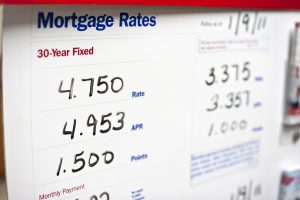If you ever use the Internet or open a newspaper, you’ve seen ads from home mortgage lenders advertising their low interest rates. You may have even contacted one of those lenders, only to learn that the advertised rate only applies if you really don’t need to borrow the money.
The interest rate does matter.
The interest rate you agree to pay will determine both your monthly payment and the total amount of interest you’ll pay over the life of the loan.
For instance, if you get a 30-year on $200,000 with a 4% interest rate, your monthly payment would be 954.83 and you would pay $143,739 in interest over the 30 years. If your interest rate rises by one quarter of a percent to 4.25%, your monthly payment would be $983.88, and you would pay $154,197 over 30 years.
Mortgage interest rates change from day to day and from borrower to borrower.
The overall range of interest rates offered to borrowers across the country fluctuate based on things such as consumer confidence, employment statistics, fluctuations on home sales, and other economic factors.
When economic activity is sluggish, the Federal Reserve will provide more funding and interest rates will go down. This is what we saw after the mortgage crisis, and rates have still not risen to pre-crisis levels.
On a more personal level, the interest rate offered to you will first depend upon the strength of your local housing market.
After that, the loan type will come into play.
Conventional mortgages – those extended to borrowers with solid assets, a steady income, well-established credit, and high credit scores – have the lowest interest rates. FHA (Federal Housing Administration) loans, VA loans, and U.S. Department of Agricultural Rural Development Loans carry slightly higher interest rates.
Next is the type of interest rate.
Borrowers can choose a fixed-rate mortgage or an adjustable rate mortgage. While a 30-year loan is standard, they can also choose a 15-year (or other) term for repayment. Shorter term loans carry slightly lower interest rates. Naturally, loan payments are higher when the term is shorter.
A fixed rate mortgage carries an interest rate that does not change throughout the life of the loan. An adjustable rate loan starts out with a lower rate that adjusts to a higher rate after 3, 5, 7, or 10 years.
After those factors are considered, the interest rate offered comes down to the borrower.
When you apply for a loan the lender will examine everything about your finances, from your credit scores to your debts, your assets, and your income. The better you look, the lower the interest rate.
Your down payment is also a consideration. The more you put down, the lower your interest rate. In addition, if you pay less than 20% of the purchase price for a down payment, you’ll have to pay for mortgage insurance. This will add from 0.3% to 1.15% to your home loan.
What is a mortgage interest rate lock and why is it important?
Since interest rates do fluctuate and borrowers are approved based upon a specific mortgage payment amount, lenders offer “rate locks.” Rate locks protect buyers from a rise in rates (and payment) that would disqualify them from obtaining a loan.
This is a commitment from a lender to give you a home loan at an agreed-upon interest rate, provided you close your loan on or before a certain date. That date is generally 30 days from the date of approval. If you’re close to closing, many lenders will extend the lock as a courtesy while others will extend for a fee.
Do remember that at this point, the loan is still provisional. You have a loan approval and a rate lock, but that loan approval is based on a last-minute review.
So don’t do anything foolish. Don’t quit your job, co-sign a loan for a friend, give your Social Security number to a salesman for any reason, apply for a new credit card, deplete your bank accounts, or run up the balances on your current credit accounts.
In other words, until your mortgage loan is finalized, don’t do anything at all to change your financial picture.










Pingback: las vegas scooter rentals
Pingback: แทงมวยออนไลน์
Pingback: Resources
Pingback: dating app
Pingback: สมัคร สล็อตออนไลน์
Pingback: psilocybin mushroom chocolate
Pingback: ที่พักเชียงคาน
Pingback: ขายฝากบ้าน
Pingback: ฟิล์มกรองแสง
Pingback: https://soflux.fr/wp-content/uploads/2023/06/21001.html
Pingback: carts for sale
Pingback: overwatch player esp
Pingback: รับสร้างบ้าน
Pingback: รักษาสิว
Pingback: รถรับส่งสนามบินในญี่ปุ่น
Pingback: jebjeed888
Pingback: fastspin
Pingback: ชุดยูนิฟอร์ม
Pingback: รับนำเข้าสินค้าจากจีน
Pingback: couples massage
Pingback: หวยน๊อตตี้ เจาะลึก หวยอ.น๊อตตี้
Pingback: Cannabis
Pingback: SMM Thai
Pingback: NIPT
Pingback: buy golden teacher mushroom
Pingback: เว็บตรงฝากถอนง่าย
Pingback: ไฟหน้ารถยนต์โปรเจคเตอร์
Pingback: casino
Pingback: Diyala University 1st